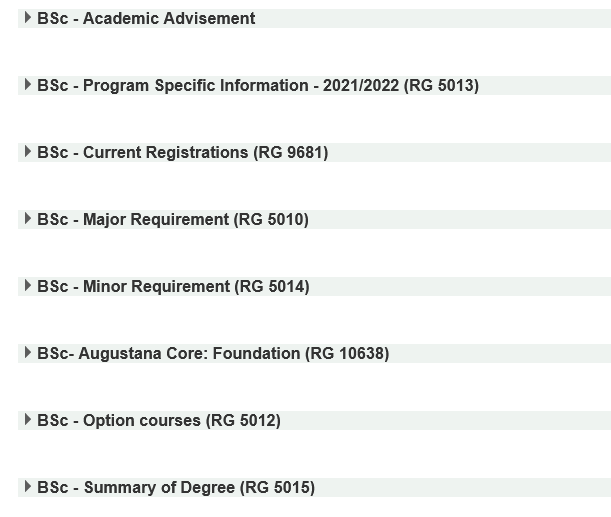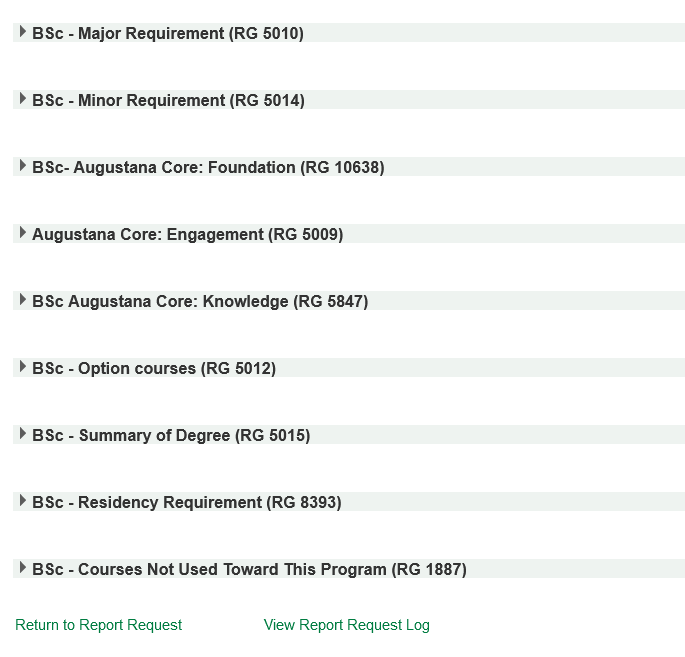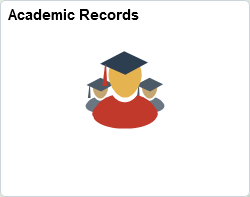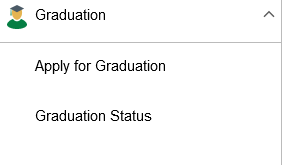One of the first steps in building your schedule is knowing which courses to take! This page will help you prioritize courses for this year and cover other important registration details so you can feel confident you're on the right track.
For a more interactive experience, we encourage you to use our Returning Student Self-Guided Registration modules.
Returning Student Self-Guided Registration Module
⭐Augustana students must select courses that begin with “AU”. All other courses are offered on the North Campus in Edmonton and are not available to Augustana students without permission from an Advisor.
⭐If you are registered or are planning to register with Augustana Proctoring, Accessibility + Student Success, this may influence your course registration.
WHAT IS THE ACADEMIC REQUIREMENTS REPORT (ARR)?
Your Academic Requirements Report (ARR) is the most important tool to guide your registration and track your degree progress. It shows the required courses for your major, minor, and the Augustana Core, as well as your program requirements and completion status. Changes in registration are instantly updated, allowing you to see how new courses fit into your program. Use the ARR to help choose your courses.
accessing YOUR arr
- Log into Bear Tracks (Opens in a New Window)
- Click on the Manage Classes tile
- Select the Academic Requirements link on the left side menu
- You will be brought to your ARR
Academic Requirement Report Walkthrough Video
Throughout your degree, you will use your ARR as a guide to enrol in courses and ensure you are meeting all of your degree requirements! Watch our Academic Requirement Walkthrough Video to learn how to find which courses are required for your major, minor, and the Augustana Core.
UNDERSTANDING YOUR ARR
Your ARR includes important information, with key sections for course enrollment. These sections reflect the Academic Calendar based on your requirement term—the year you started your program—so current requirements may differ from those listed on your ARR.
⭐If you notice any issues, such as incorrect credit counts, or a course not showing up where you think they should please contact the student advisors at augsas@ualberta.ca or through the Student Service Portal for assistance.

This section lists all of the courses required to fulfill your major.
⭐What if I am an Undeclared major?
If you are an undecided student, please contact your Student Advisor to discuss your options and to declare a major and/or professional intent.
These are required courses in disciplines outside your major that may be a prerequisite for specific courses in your major or support your major in other ways.
Depending on your major, you may not have this section.
This section will explain all of the courses required for any certificates you have added to your program.
Note: Psychology and Mental Health majors are required to complete a Co-curricular certification. See the Academic Calendar for more details.
Students should complete the corresponding level of the Project-Based Core (AUIDS 101, 201, 301, and 401) during each year they are studying at Augustana.
AUIDS 101: As a returning student, you would have likely taken this foundation seminar last year. If not, contact your Student Advisor to discuss your registration.
AUIDS 201/Collaborative Seminar: In this course, you will engage in group projects and further build your problem-solving skills. Many different courses can count towards this requirement. Review your ARR for a list of acceptable courses.
AUIDS 301: This course will allow you to apply your problem-solving skills by working with a community stakeholder! Students may enroll in AUIDS 301 upon completion of AUIDS 201. As such, students may enroll in the winter of Y2, the fall or winter of Y3 or the fall of Y4. This allows for additional flexibility for students intending to participate in an off-campus experience such as a study tour or an exchange program.
AUIDS 401: In this course, you will use all of the skills and knowledge gained from your previous foundation courses by working with a team to come up with a solution to a real-world issue.
Incoming Transfer Students should refer to their Transfer Credit Assessment or email augsas@ualberta.ca to see which Foundation courses are required.
Note: The BSc/Ed program and BMus program have slightly different Augustana Core Requirements. Please contact a student advisor at augsas@uablerta.ca or through the Student Service Portal for details
During your degree, you'll take courses across various disciplines to fulfill core requirements:
★6 Social Sciences
★6 Sciences
★9 Fine Arts and Humanities (you must complete at least ★3 in each area).
Note: Some majors integrate the Knowledge component of the Core into their requirements.
Courses that do not fit into the above categories will make up the remainder of your degree requirements. Regardless of what you take, it will help you fill up the ★120 you need to complete your degree.
Electives allow you to take prerequisites for professional programs, explore other interests, fulfill additional science requirements for BSc students, and develop career skills.
Transfer students should keep a close eye on their Residency Requirement credits to ensure they will meet this requirement for graduation.
⭐If you notice any issues, such as incorrect credit counts, or a course not showing up where you think they should please contact the student advisors at augsas@ualberta.ca or through the Student Service Portal for assistance.
IMPORTANT - Program/Major Specific Information
Certain majors may have course exceptions and specific recommendations based on the courses offered in the upcoming academic year. This information was shared during the Major-Specific Meetings at the Augustana Course Registration Fair on March 19th. You should also receive these details from your department after the fair via email.
Additional Information to be aware of:
- For detailed descriptions of Selected Topics courses being offered in 2025-2026
- Off-campus experiential learning trip information.
Steps to choosing the right courses
- Review your ARR and note your remaining requirements. (Printing the PDF helps.) Use a What-If Report if declaring or changing your major/program.
- Check the Course List Tool and take note of what term and session (3-week block vs 11-week session) your remaining requirements are taught in. REMEMBER - Some courses are only taught every second year so if you do not see a required course listed as being taught next year, it is likely because it will be taught the following academic year.
- Review pre/co-requisites for your remaining courses to ensure you meet them.
- Build your schedule and register via Bear Tracks. (see the Enrolment Walkthrough for details).
- Optional: Meet with a Student Advisor, especially if planning to graduate by year’s end.
Note: If you're a senior student (>24 credits), review the senior courses required for your program. It's common to take 300-level courses in your second year if you meet the prerequisites.
Important Deadlines
It is a student’s responsibility to be aware of all deadlines. To confirm the Add/Drop and Withdrawal Deadlines, check out the “Important Dates” page.If you plan to drop your 3-week course and add a new class, ensure you complete this right away!
⭐Subscribe to the Academic Schedule calendar to stay informed of important deadlines.
- Open Google Calendar
- Click on the arrow next to Other calendars
- Click on "Add a coworker's calendar".
- Paste acadsch@ualberta.ca into the box and click "Add"
Important Considerations
⭐ Some of the required courses listed on your Academic Requirements Report may be offered on a two-year rotation. As a result, they may not be taught in the upcoming academic year.
⭐When in doubt connect with a student advisor at augsas@ualberta.ca or through the Student Service Portal
Students must request a Visiting Student Letter to take a class elsewhere via the Augustana Visiting Student Letter Request Form. The SAS office will review the submission for transferability and program fit. If approved, the assistant dean of enrollment management will issue the letter.
Before submitting, students should identify which non-Augustana class(es) they wish to take.
Students can check the Alberta Council on Admission and Transfer Guide for existing transfer agreements. The absence of a formal agreement does not necessarily indicate that a course will not transfer.
⭐ Students must be in good academic standing and have completed a minimum of 24 credits to be granted a VSL.
If you plan to graduate in Spring 2026, check your Academic Requirements Report to ensure all categories are complete. Once a category has been completed, it will close up on your report. We recommend viewing your ARR as a PDF to confirm that all categories are being filled correctly.

Students must apply for graduation through their Bear Tracks account. You can apply for graduation in Bear Tracks beginning October 1 by going to Academic Records > Apply for Graduation. The deadline to apply for Spring graduation is February 1.
Step 1

Step 2

If you are planning to pursue a professional program after Augustana, there may be specific courses you are required to take. You can use the Graduate Studies Program Tool to find out more about the admission requirements, or you can let your Academic Advisor know your intention during an appointment. The information you provide will assist in advising you through course registration and can influence the courses you enrol in during your degree! We may also use this to connect with you about any relevant events and/or information for your desired program.
We recommend athletes enroll in ★15 (5 courses) per term and adjust if needed before the add/drop deadline. Keep in mind, that your league or program may require a certain number of credits each semester to compete, and a reduced course load could affect your eligibility for scholarships or awards.
Also, consider your practice schedule when registering. If you’re away on Friday afternoons for games, limiting Friday afternoon classes may be beneficial.
What’s Next?
Identifying the courses you should take is important! There will, however, be room in your schedule to take other courses that align with your interests and future plans. Check out the Key Links and Resources to see when your required courses are offered and what else is available. If you need help with building your schedule check out the Walkthrough.
